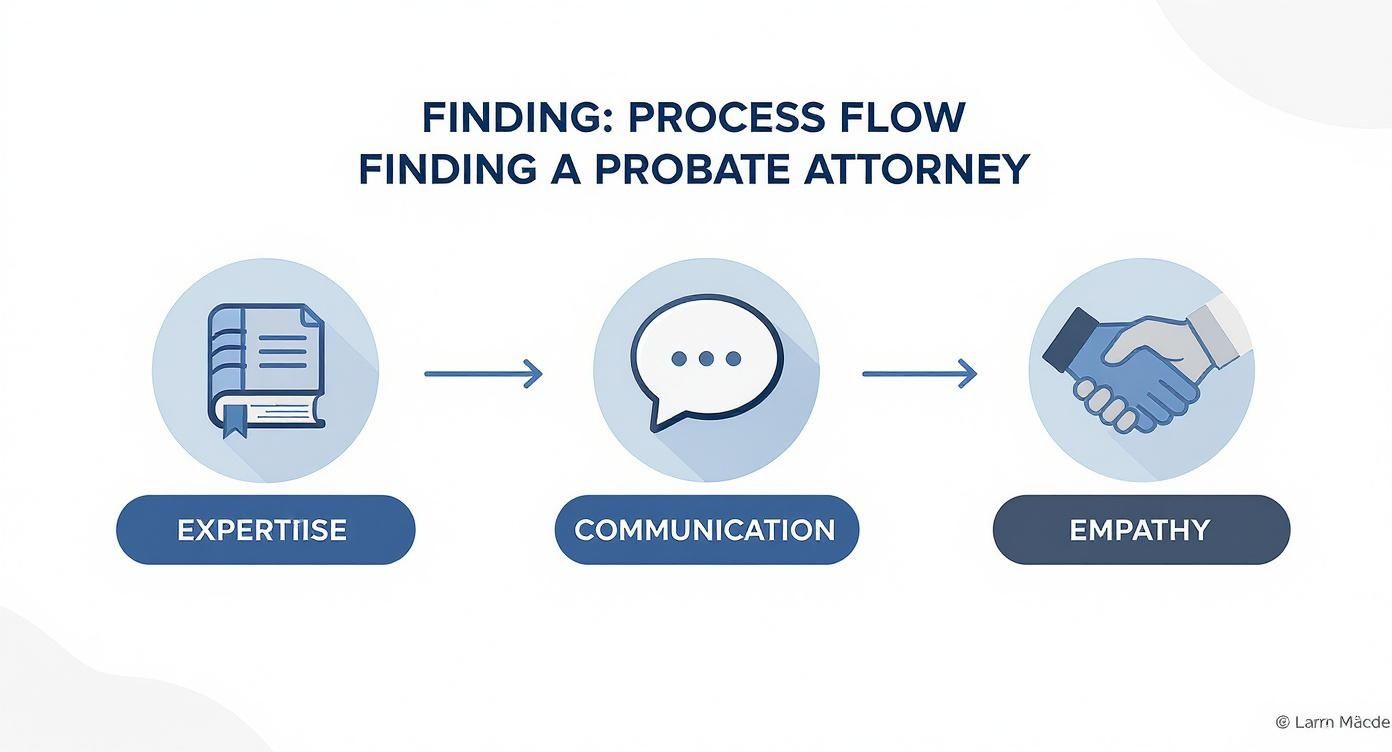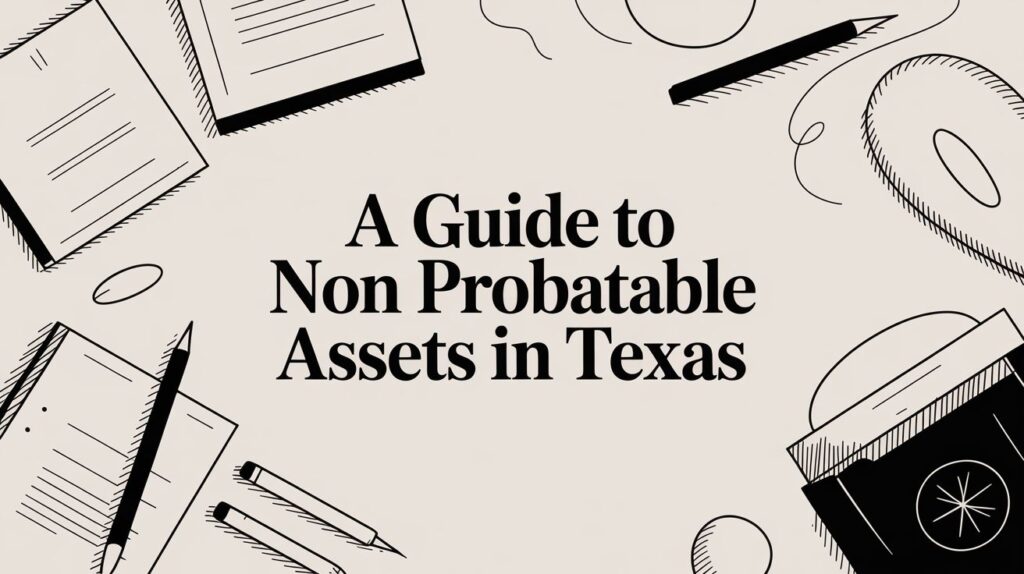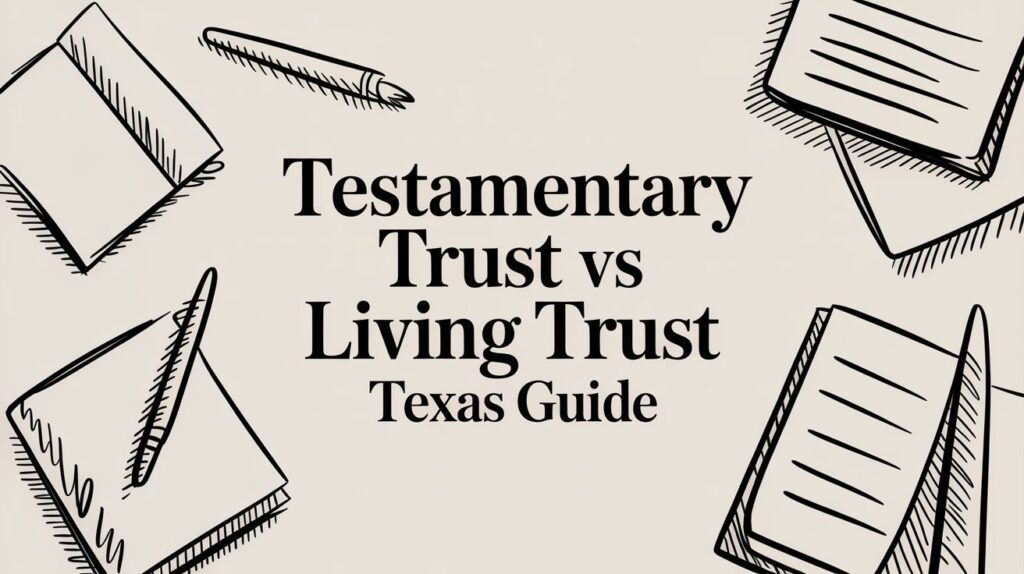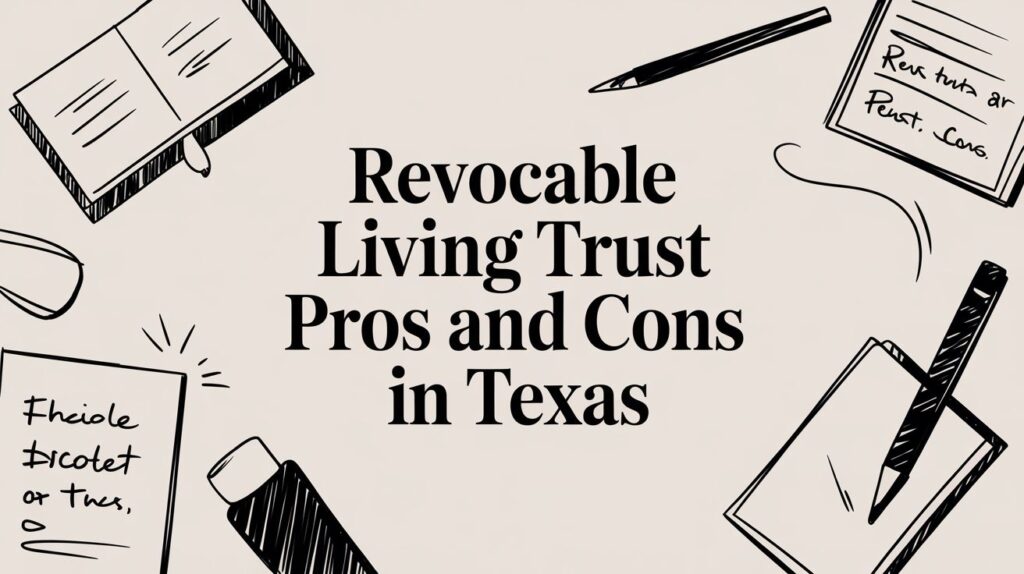Losing a loved one is hard enough. The last thing you need is the added weight of legal jargon and court dates during a time of grief. Probate—the official court process of validating a will and settling an estate—can feel like a mountain to climb, but with the right guidance, it doesn't have to be.
The single most important decision you can make is finding an experienced local guide. A probate lawyer near you won't just file papers; they'll know the specific procedures of your Texas county court, from Harris to Travis, and can offer compassionate guidance that's actually relevant to your family's situation.
Why a Local Texas Probate Lawyer Matters

When you're grieving, deciphering the Texas Estates Code is probably the last thing on your mind. The Texas Probate Process involves a series of precise, non-negotiable steps, from filing the will with the correct county clerk to notifying creditors and distributing what's left to the heirs. This is where a local attorney becomes your most valuable ally, turning a confusing legal requirement into a clear, manageable path forward.
The Advantage of Local Expertise
Think of it this way: a lawyer who practices in your county's probate court every day understands the unwritten rules and the unique preferences of the local judges. This kind of insider knowledge can make a massive difference in how smoothly your case moves forward.
They know the little things that outsiders don't:
- Specific filing requirements that can change from one county courthouse to the next.
- The tendencies of local probate judges and how they tend to rule on certain issues.
- Established relationships with court clerks and staff, which can help cut through red tape and resolve minor issues in minutes, not weeks.
This local familiarity is what prevents frustrating delays and ensures your case is handled efficiently right from the start. As we detail in our guide on how probate laws differ across Texas counties, these local quirks are far more important than most people realize.
A Realistic Scenario: The Value of Local Knowledge
Let’s say you’re the executor for your mother’s estate in Harris County. Her will is clear, but the estate includes her home, a small investment account, and a car. A local Houston probate lawyer will already know which appraisers the Harris County probate court trusts for real estate valuations. They’ll know the exact documentation the County Clerk’s office demands for property transfers and can anticipate potential creditor claims, potentially saving the estate weeks of frustrating back-and-forth and ensuring a smoother process for your family.
Estate law is a big business—valued at $18.2 billion in the U.S.—but it’s also highly localized. Local attorneys build their entire reputation on strong community ties and a track record of successful outcomes for families just like yours. You can dig into more data about the U.S. estate law market on IBISWorld.
What Makes a Great Probate Attorney? (It's More Than a Law Degree)
When you start searching for a "probate lawyer near me," it’s easy to assume that any attorney with a law degree will do. But technical skill is just the starting point. The right attorney is both a legal strategist and a compassionate guide, someone who helps your family feel supported during what is almost always a difficult time.
First and foremost, you need someone with demonstrated experience in the Texas Estates Code—specifically Titles 2 and 3, which are the rulebooks for how Wills & Trusts are handled and estates are administered. A top-tier attorney won't just know the law; they'll have a proven track record right here in your local county probate court. They understand the quirks of local rules and even know the preferences of the judges, which can save you from costly delays and headaches.
Beyond Knowing the Law
While that deep legal knowledge is critical, communication and compassion are just as vital. Think about it: a great probate lawyer should be able to explain complex legal terms like "letters testamentary" or "independent administration" in plain English, without making you feel lost or overwhelmed.
- Letters Testamentary: This is simply the official court document that gives an executor the legal authority to act on behalf of the estate.
- Independent Administration: A streamlined form of probate in Texas that allows the executor to manage the estate with minimal court supervision, saving time and money. It is often requested in a will.
A great attorney is a patient teacher, ensuring you understand every step of the process and feel confident in the decisions you’re making. This goes way beyond just returning your phone calls. It’s about getting proactive updates and feeling like you're in a supportive environment where no question is a bad question. A huge indicator of an exceptional attorney is how organized they are. Proficiency in effective document management for law firms is a must-have, ensuring that every single filing and deadline is handled with precision.
Comparing Legal Expertise for Estate Matters
This table shows why a dedicated probate lawyer often delivers better results than a general practice attorney when it comes to administering an estate.
| Attribute | Probate Law Specialist | General Practice Attorney |
|---|---|---|
| Experience | Handles probate cases daily; deep familiarity with the Texas Estates Code. | May handle probate cases infrequently, alongside other legal areas. |
| Local Court Knowledge | Understands specific procedures and judicial preferences in your local court. | May have general knowledge but lacks nuanced, local insights. |
| Efficiency | Anticipates common roadblocks and streamlines the process to avoid delays. | More likely to encounter unexpected issues, leading to a longer timeline. |
| Communication | Fluent in explaining complex probate terms in simple, understandable language. | May use overly technical legal jargon, causing confusion for clients. |
| Network | Has established relationships with court clerks, appraisers, and accountants. | Lacks a specialized network, requiring more time to find resources. |
Ultimately, a specialist's focus means they've seen it all before, which translates into a smoother, faster, and less stressful experience for you and your family.
How to Find Potential Probate Lawyers in Your Area
Knowing where to even start looking for a "probate lawyer near me" can feel like the hardest part of the process. The good news is that a few trusted methods can help you build a solid list of candidates without getting lost in endless online searches.
A great first move is simply asking for referrals from professionals your family already knows and trusts. Think about your accountant or a financial advisor—they often have established relationships with reputable estate attorneys and can point you in the right direction.
Another excellent resource is the State Bar of Texas's official attorney search tool. It lets you filter specifically for "Estate Planning & Probate," so you can find certified specialists right in your city. And while online directories like Avvo can offer insights, always read the client reviews carefully to get a feel for an attorney's communication style and overall approach.
Building Your Shortlist
Your initial goal should be to create a shortlist of three to five qualified local attorneys to interview. With over 1.3 million lawyers in the U.S., the sheer number of options is dizzying, and availability can vary wildly depending on where you are. Clio offers more insights on lawyer demographics if you're curious. Focusing your search on local specialists is the key to cutting through the noise.
This process isn't just about finding someone with a law degree; it's about finding the right blend of qualities.

As you can see, the ideal attorney is someone who combines deep legal knowledge with the ability to connect with and support your family during a difficult time.
To help you get started, you might also want to check out our list of local probate court resources in Texas. This can help you better understand the specific court system your family will be navigating.
Making the Most of Your Initial Consultation

Think of the initial consultation as your chance to interview a potential legal partner. It’s so much more than a quick chat about fees; it's a two-way conversation to see if an attorney has the right expertise, communication style, and frankly, the right temperament to guide your family. A little preparation goes a long way in making sure you walk out feeling confident and informed.
Before you even step into their office, try to gather a few key documents. Having these on hand will make the conversation infinitely more productive.
- The Original Will: If one exists, this is the single most important document.
- A Certified Death Certificate: This is a non-negotiable for nearly every legal filing.
- A Basic List of Assets: Jot down any real estate, bank accounts, investments, and significant personal property. You don't need exact values right now; a general overview is perfect.
Questions That Reveal True Expertise
Going beyond "How much do you charge?" will tell you everything you need to know. The answers to the right questions can reveal an attorney’s actual, hands-on experience with cases just like yours.
Here is a step-by-step guide to help you prepare:
- Ask about their specific experience: "What percentage of your practice is dedicated specifically to probate cases in this county?"
- Understand their process: "Can you walk me through the typical steps for an estate of this size here in Texas?"
- Clarify communication: "How will your office keep me in the loop about progress and important deadlines?"
These questions shift the focus from cost to capability and communication—two things that are just as vital for a smooth process.
A Practical Scenario in Dallas
Let's imagine you're probating an estate in Dallas that includes a family-owned business. You ask, "Can you describe your process for an estate like this in Dallas County?"
A truly experienced lawyer might immediately bring up the need for a business valuation and even mention a few specific appraisers who are well-regarded by the local probate court.
That kind of detailed, location-specific answer is gold. It demonstrates practical, on-the-ground experience and shows they aren't just reciting the Texas Estates Code; they are applying it to your unique situation. This is the kind of clarity you deserve when you're searching for a probate lawyer near me.
Understanding Attorney Fees for Texas Probate

Let's talk about the elephant in the room: cost. Navigating probate is stressful enough without worrying about legal bills. It can feel uncomfortable discussing money, especially while grieving, but understanding how lawyers charge for their services is the first step toward making a clear-headed decision for your family.
In Texas, you'll generally run into a few common ways probate attorneys structure their fees.
Common Fee Arrangements
The most traditional approach is hourly billing. Just like it sounds, the attorney charges for the actual time they spend working on your case—whether that's drafting court documents, making phone calls, or appearing before a judge. This model is straightforward, but it can feel unpredictable. The final cost really depends on how complicated the estate turns out to be.
For simpler, more predictable estates, many lawyers offer a flat-fee arrangement. They’ll quote you a single, fixed price to handle the entire probate process from start to finish. This gives you certainty and makes it much easier to budget, which is a huge relief for many families.
You might also hear about contingent fees, but these are less common in standard probate cases. This structure is typically used in probate litigation where there’s a dispute, like a will contest. The attorney’s fee is a percentage of whatever assets they successfully recover for the estate or the heir. Put simply, they only get paid if you win.
Finding a local probate lawyer with a clear and upfront fee structure is the best way to build a foundation of trust. If you're looking for a deeper dive into the numbers, check out our detailed guide on what a Texas probate lawyer costs in 2025.
Making a Confident Final Decision
You’ve done the research and sat through the consultations. Now comes the hard part: choosing the one person who will guide your family through this complicated time. This decision is about more than just credentials on a wall—it's about finding an advocate who gives you confidence and, frankly, a little peace of mind.
The final choice really comes down to a mix of objective facts and your gut feeling.
Think back on your conversations. Did one lawyer explain the Texas Probate Process in a way that just clicked? Did you feel like they were genuinely listening, or were they just waiting for their turn to talk? This isn't like hiring a plumber; it's about finding a partner who can lift some of the weight off your shoulders.
Trusting Your Judgment
The relationship you build with a probate attorney is deeply personal. You're going to be sharing sensitive family details and relying on their guidance during what is already an emotional and vulnerable period. That’s why your comfort level and trust in their character are just as critical as their legal expertise.
To help frame your thinking, this comprehensive guide on choosing the right attorney offers some fantastic insights. While it focuses on a different area of law, the core principles—evaluating experience, discussing fees, and asking the tough questions—are universal. Your final choice should be the professional you believe can navigate the legal maze with both skill and real compassion.
Ultimately, this is about finding someone who will protect your family’s interests and bring clarity to a confusing time. The goal is to walk away from this decision feeling secure, knowing you have a capable and caring partner ready to help.
Common Questions About Hiring a Probate Lawyer
When you start searching for a probate lawyer near me, a lot of questions pop up. It's completely normal. Here are some straightforward answers to the things Texas families most often ask.
Do I Always Need a Lawyer for Probate in Texas?
Legally, no, Texas doesn't force you to hire a lawyer for every single probate case. But practically speaking? It's almost always the right call.
Think of it this way: probate is a formal court process with strict filings and deadlines that are incredibly easy to miss. Making a mistake can be costly and drag things out for months. If the estate involves anything more complicated than a simple bank account—like real estate, investments, business interests, or a Guardianship matter—the risk of error skyrockets.
An experienced probate attorney isn't just a guide; they're your safeguard, making sure every step you take aligns with the Texas Estates Code.
What Is the Difference Between an Executor and an Administrator?
It's a common point of confusion, but the distinction is pretty simple. An executor is the person named in the will to manage the estate. They were chosen by the person who passed away.
If there is no will, the court steps in and appoints an administrator to handle the exact same duties.
Despite the different titles, their core responsibility is identical. Both are held to a high legal standard called a fiduciary duty, which means they must always act in the best interest of the estate and its beneficiaries, not themselves.
How Long Does Probate Usually Take?
This is the million-dollar question, and the honest answer is: it depends entirely on the estate's complexity.
For a straightforward case with a valid will, no debts, and cooperative heirs—what we call an independent administration—you might wrap things up in six to twelve months.
However, the timeline can stretch out significantly if complications arise. Things like selling a house, sorting through creditor claims, or a disgruntled heir contesting the will can turn a simple process into a lengthy court battle known as Probate Litigation.
Key Takeaway
Choosing a local probate lawyer is about more than convenience; it's about securing an advocate with specialized, on-the-ground knowledge of your specific court system. The right attorney blends deep knowledge of the Texas Estates Code with genuine empathy, turning a stressful legal obligation into a manageable, clear process for your family. No matter the fee structure, always insist on a written agreement that outlines all costs and services to ensure transparency and build trust from day one.
If you’re facing probate in Texas, our team can help guide you through every step — from filing to final distribution. Schedule your free consultation today.







